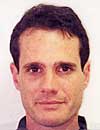Wayne Odesnik and the Human
Growth Hormone Fiasco
Matt Cronin
 |
The Odesnik bust highlights deeper problems with drug testing. |
The Wayne Odesnik humane growth hormone fiasco shows tennis isn't policing its own - and furthermore when we look at the issues around testing for HGH, probably can't in the immediate future.
After Odesnik was busted for bringing eight vials of HGH into Australia, according to customs officials, he first claimed he had a doctor's prescription to take it. Then he changed his story and claimed he bought it on the internet.
Later he changed his story again and denied he had ever taken it--despite that fact that he pled guilty to its transport. Commented Australian Magistrate Graham Lee: "I found Mr. Odesnik's explanation for his possession of the vials to be unsatisfactory to say the least."
In his defiance, Wayne was, bizarrely, following in the footsteps of the actor Sylvester Stallone (aka "Rocky") who himself was busted in Australia for 48 vials of HGH and had this to say: "Anyone who calls it a steroid is grossly misinformed. Testosterone to me is so important for a sense of well-being when you get older. Everyone over 40 years old would be wise to investigate it because it increases the quality of your life. Mark my words. In 10 years it will be over the counter."
Why the defiance from Odesnik? One possible explanation is that Odesnik knows that it will be virtually impossible to prove whether he shot up HGH or not.
 |
Sly Stallone, a man who thinks HGH should be over the counter. |
What this case highlights, once again, is that the cheaters are way ahead of the anti-doping authorities in tennis as well other sports. And this means it's possible that within our sport there are still desperate men or women who are willing to risk their long term health for short term game and in the process, steal victories and prize money from others.
HGH is a naturally occurring hormone that is produced by the pituitary gland and is responsible for normal growth and development. It's responsible for a person growing taller, but has also been proven to reverse muscle wasting in people suffering from AIDS and it is claimed that HGH supplements slow down the aging process. Athletes are said to take it because it has muscle building and stamina increasing properties, as well as reducing body fat.
What's most problematic about HDH as opposed to other performance enhancing drugs is that its been almost impossible to detect in blood or urine tests. In fact, it wasn't until February that for the first time, a blood test managed to detect HGH, when a British rugby player, Terry Newton, was banned from the sport for two years by the UK Anti-Doping Agency.
The World Anti Doping Agency (WADA), which also oversees the testing in tennis, cheered, but what's to get so happy about when literally hundreds of blood tests were performed at the Olympic Games and no one was detected to have been using HGH, even though like Odesnik, a few high profile Olympians have been caught carrying it.
 |
Human Growth Hormone is a naturally occurring compound that is very difficult to detect. |
For years there have also been rumors swirling around the junior tennis world about the use of HGH, but in junior tennis there is no testing and the same detection issues would apply anyway.
WADA Director General David Howman seems convinced that the testing has improved to the point where the Newton case won't be one off, saying, "I suggest to cheaters to keep in mind that the World Anti- Doping Code makes it possible to open a disciplinary proceeding within eight years from the date an anti-doping rule violation occurred, and that stored samples can be reanalyzed."
But Howman has also said that out-of-competition tests for HGH are more likely to turn up athletes who are using the substance, because the current tests can only detect a substance that has been there for a few days, which would mean that only a true idiot would continue taking HGH during a tournament.
"We strongly believe that it's best to do it (the testing) out of competition, when there is no notice," said Howman.
But, because players out of the top 50 aren't subject to the ITF's "Whereabouts Rule," which requires them to inform authorities where they are 365 days a year, players who are taking HGH are virtually home free. They can take HGH out of competition in a locale unknown to the authorities, without worrying about someone banging on their door. Then they can clear out of their system before they show up at an event.
According to an ITF document, Odesnik himself was tested for drugs in competition just once in 2009. So what WADA and the ITF are left with, if they are concerned with the elusiveness of testing for HGH, is asking tennis authorities to spend more money to hire more anti-doping testers for out of competition testing. That's not likely to happen given the poor state of the world economy.
 |
Odesnik's lawyer, Christopher Lyons (right), with another client, accused athlete, Donte Stallworth. |
Essentially, what tennis is faced with in the near future is the faint hope that blood testing will remarkably improve, and that players who are caught possessing HGH and like will finally take the high road. Every tennis player who has been caught doping (and there are now a few dozen) has pleaded innocent, or made up some excuse, instead of just standing up.
Odesnik hasn't stood up either, despite being widely condemned by fellow players, two of whom, Andy Roddick and Mardy Fish, have said that he shouldn't be allowed to play any more.
When the news broke in late March, another two of his peers told me anonymously that they thought he was on something even a few years ago as he become sizably bigger at too rapid of a rate.
Somewhat crazily, Odesnik decided to compete in the US Men's Clay Courts in Houston, where he reached the quarterfinals. He's facing a suspension of up to two years, but is allowed to compete while the ITF is still investigating the matter, This is because he's entitled to due process and elected not to take a provisional suspension.
 |
Is this the type of guy tour players should face? |
"Whether or not we feel this is good for the image of tennis, he has that right and the ITF and ATP have an obligation to honor it," the ITF said.
Odesnik has gone so far as to hire high-powered Miami defense attorney Christopher Lyons to represent him. This is the same lawyer who defended Cleveland Browns wide receiver Donte Stallworth, who plead guilty to killing a pedestrian while driving drunk in Florida last year, as well as former football Pro Bowler Warren Sapp, who was arrested the day before the Super Bowl on suspicion of misdemeanor domestic battery, but was never prosecuted.
Regardless of how long Odesnik manages to stay in the sport before he is suspended (and it is hard to believe he will not be after pleading guilty to possession no matter who his attorney), he's creating a lot of ill will and giving black eye to the sport.
Take it from Poland's Jerzy Janowicz, who Odesnik defeated 6-3, 6-4 in Houston. "I think it's unfair." said Janowicz. " For sure he should be suspended. It's a bad feeling that I have to play with that kind of guy."






